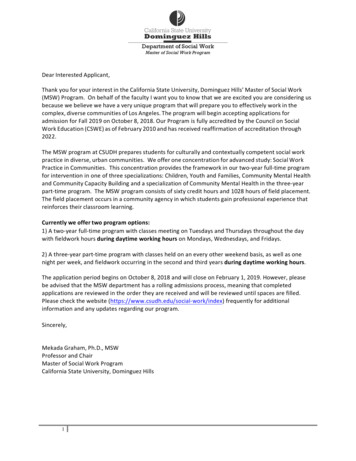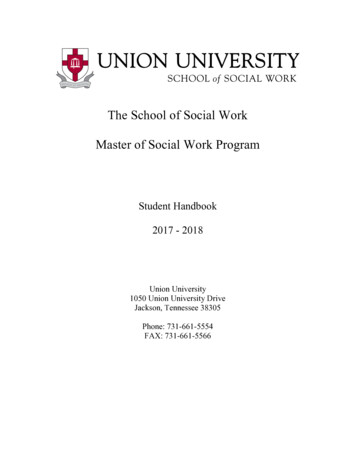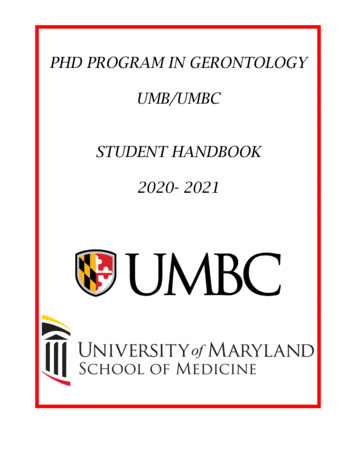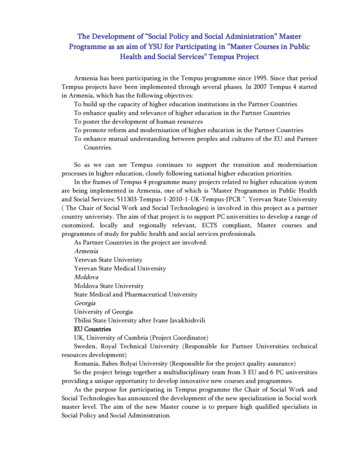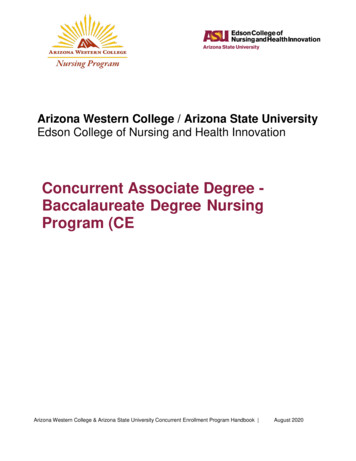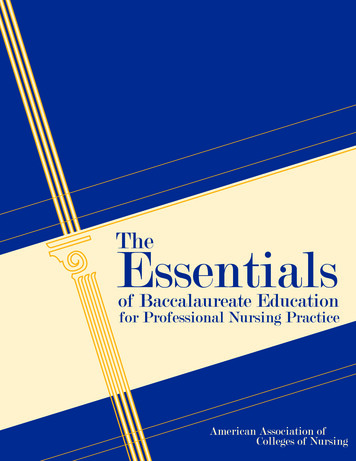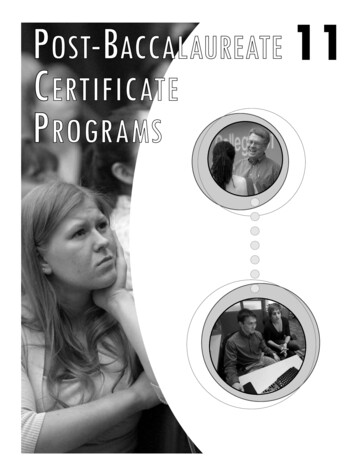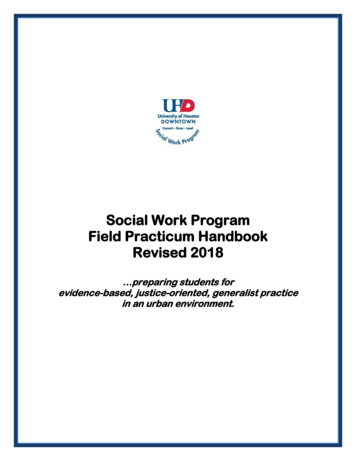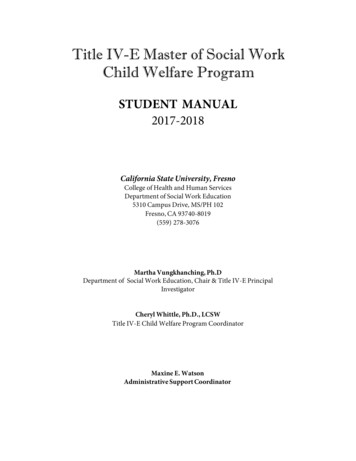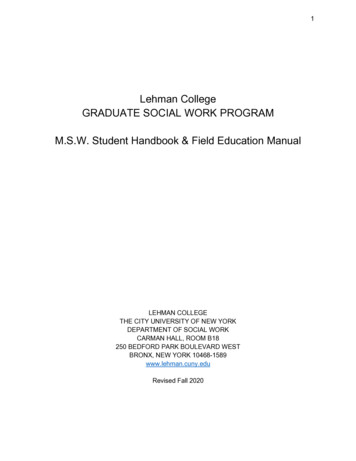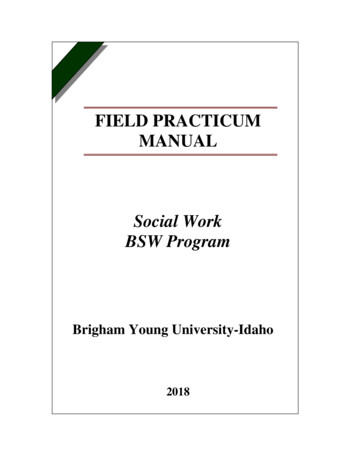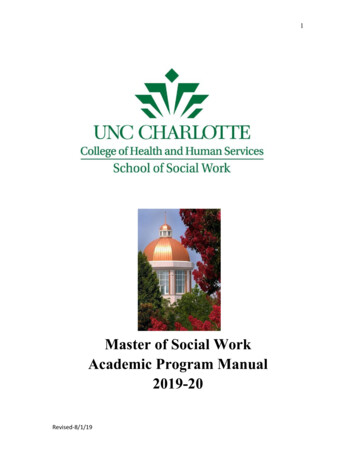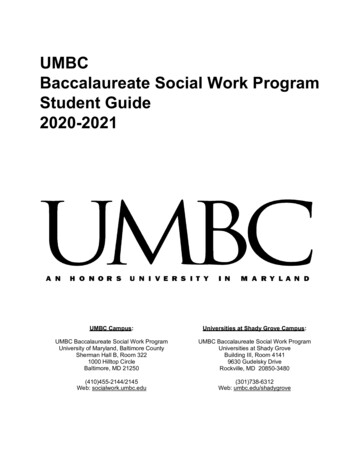
Transcription
UMBCBaccalaureate Social Work ProgramStudent Guide2020-2021UMBC Campus:Universities at Shady Grove Campus:UMBC Baccalaureate Social Work ProgramUniversity of Maryland, Baltimore CountySherman Hall B, Room 3221000 Hilltop CircleBaltimore, MD 21250UMBC Baccalaureate Social Work ProgramUniversities at Shady GroveBuilding III, Room 41419630 Gudelsky DriveRockville, MD 20850-3480(410)455-2144/2145Web: socialwork.umbc.edu(301)738-6312Web: umbc.edu/shadygrove
Table of ContentsWelcome .1Is Social Work the Right Major for You? .2Program Description .3Fields of Practice .4Generalist Social Work . 6Mission and Goals . 7Values . 8Nine Core Competencies . 8Assessment . 9The Curriculum . 10Liberal Arts Foundation . 10Social Work Core Curriculum . 11Diversity Content Across the Baccalaureate Curriculum .12Field Education .12Field Placement Process .13Field Seminar . 14Academic Standards in Field Education . 15Professional License Disclaimer. 16Title IV-E Child Welfare Program . 16Advising Resources . 17Guidelines on Previous Life or Work Experience .18Sample Educational Plan . 20Transfer Students .21Evening and Part-time Options . 21Student Disability Services . 21Nondiscrimination Policy Statement . 23Student Academic Conduct policy . 23Discontinuation in the Program . 23Course Repeat Policy . 24Incomplete Grades . 24Student Complaint Resolution . 24Social Welfare Minor . 25Course Descriptions . 26Social Work Listserv . 31Social Work Majors’ Computer Lab . 31Student Organizations . 32Student Role in Forming and Modifying Policy . 32Advanced Standing . 33Contact Information for UMBC’s Social Work Programs . 34Appendix A . NASW Code of EthicsAppendix B . Non-Discrimination and Title IX/Sexual Misconduct Policy StatementsAppendix C . Social Media GuidelinesAppendix D .Academic Advising ChecklistAppendix E . Calculation of Cumulative Grade Point Average WorksheetAppendix F . Faculty ProfilesAppendix G . Faculty and Staff List
WELCOMEThis is the School of Social Work Baccalaureate Program’s Student Guide designed forindividuals considering undergraduate study in social work. The guide is not intended tosubstitute for the UMBC online catalog or advising sessions with an assigned faculty member.Rather, the guide serves as a resource and reference book for students interested in orenrolled in the Baccalaureate Social Work Program. It provides important information on manytopics and serves as a reference on matters related to the course sequencing and theprogram’s expectations and requirements. Later in the educational process, students willreceive the Field Education Manual, another resource for continued development inbecoming a social worker.Ten Steps to Success in the Social Work Major1. Read this Student Guide and become familiarized with its content.2. Follow all academic integrity and professional code of ethics policies.3. Schedule and prepare for an advising session each semester with anassigned social work academic advisor.4. Monitor the completion of UMBC’s General Education Program (GEP) orGeneral Foundation Requirements (GFRs).5. Complete all required courses for the social work major.6. Maintain at least a grade point average (GPA) of 2.5.7. Join the Social Work Listserv.8. Participate in the Social Work Student Association (SWSA).9. Plan for the field education experience which requires two full dayseach week throughout the final academic year.10. Catch the social work spirit of service, academic excellence, andethical behavior.
IS THE SOCIAL WORK MAJOR RIGHT FOR YOU?Students decide to major in social work for many reasons. Some students wereintroduced to social work by having a family member or acquaintance in the profession.Others have a long-standing commitment to entering the field through early experiencein volunteer or paid service. Some students have been recipients of help from a socialworker and are motivated to “give back” by entering the field as a provider of services.Social work can be a challenging and rewarding profession for individuals who: are motivated to empower and assist others. engage in active problem-solving at personal and societal levels. recognize the strengths of people and communities. acquire and apply the necessary knowledge and skills. are committed to the values, ethics, and obligations of the profession. have personal stamina and mental health for dealing with stressful conditions andsituations. can invest in the process of enhancing others’ lives. have a global perspective of social conditions. will become licensed as a social worker upon graduation.While most students who declare a major in social work believe “This is the professionfor me!” it is sometimes necessary for a student to reconsider the decision to pursue acareer in social work.Re-thinking the decision to major in social work sometimes occurs as students progressthrough the curriculum and become aware that their values, interests, and inclinationsare not congruent with the social work perspective. Other students discover that anotherdiscipline or major is better suited for their future goals. Sometimes students completethe preliminary courses in social work and enter a field placement only to realize that,“It’s not what I thought it was going to be.” Occasionally, students discover—throughclass discussions and exposure to the field—that they have personal issues orexperiences that need to be resolved before commencing a career in social work.Baccalaureate social work education is the only undergraduate major thatprepares students to be professional social workers.2
PROGRAM DESCRIPTIONThe Baccalaureate Social Work Program at UMBC is organized within the University ofMaryland School of Social Work. The School offers a continuum of social work degreeprograms: baccalaureate, master’s, and doctoral. All are fully accredited by the Councilon Social Work Education (CSWE). CSWE is the national organization founded topromote and improve the quality of education in social work. Based on this accreditation,students are assured that the quality of their education at UMBC meets nationalstandards for social work programs. The program at UMBC is responsible for preparingthe baccalaureate-level professional at two convenient locations: The UMBC campus islocated in Baltimore County (Catonsville), Maryland and the Universities at Shady Grovecampus (USG) is located in Rockville, Maryland.The MSW and PhD graduate degrees are offered at University of Maryland, Baltimore(UMB), located in the heart of the city, 15 minutes from the UMBC campus, and theMSW program with a Behavioral Health concentration is also located at the Universitiesat Shady Grove in Rockville, MD. For more information about UMB call 410-7067790 or go to the School of Social Work website: www.ssw.umaryland.edu.DEGREE AND PROFESSIONAL CREDENTIALSStudents in the Baccalaureate Social Work Program earn the Bachelor of Arts degreewith a major in social work and a second major or minor in another area of study.Students graduating from the Social Work Program are prepared for generalist practicein social service agencies in the public, private, and corporate sectors across all fields ofpractice.Students are also prepared to continue their professional education in master’s degree(MSW) programs. Those who choose to pursue graduate study might be considered forAdvanced Standing Admission, but this depends on the entrance criteria of the graduateprogram to which the student is applying. Advanced Standing Admission is a statuscreated by the CSWE that provides waivers of selected master’s courses for social workgraduates with outstanding undergraduate academic records and fieldrecommendations.For more about CSWE call 703-683-8080 or visit the website: www.cswe.org.Social work students and graduates are eligible for membership in the NationalAssociation of Social Workers (NASW).To get more information about NASW call the Maryland Chapter at 410-788-1066 orgo to the website: www.socialworkers.org.Graduates qualify to take the Maryland state examination to become Licensed BachelorSocial Workers (LBSW) in Maryland. They are also qualified for examination in otherstates that license baccalaureate practice.To obtain more information about social work licensing call the Licensing Boardat 410-764-4788 or go to the ult.aspx3
FIELDS OF PRACTICEThe established fields of practice recognized by the social work profession include:Children and YouthEncompasses an array of service delivery systems and client populations includingpregnancy counseling, foster care and adoption, neglect and abuse, residential services(group homes, institutional care), school social work, and programs for youthfuloffenders.Job Opportunities:Foster Care CaseworkerCourt Appointed Special AdvocateChild Protection WorkerAfter-School Program CoordinatorPregnancy Prevention CounselorTeen Center Assistant DirectorChild Care WorkerChild Support Case OfficerYouth Corrections OfficerViolence Prevention CounselorResearch AssistantAdoption CaseworkerParent EducatorCounselor and more!Child AdvocateGerontologyProvides service delivery to persons who are older in a variety of settings ranging fromadult day centers, public social services, at-home support services, to skilled nursinghomes.Job Opportunities:Recreation SpecialistProgram CoordinatorHospice CoordinatorAdult Day Care CoordinatorAdult Protection WorkerCase Manager and more!Health CareFocuses on people of all ages and diagnoses receiving medical care in hospitals, publichealth clinics, hospice settings, and through home health care.Job Opportunities:Medical Social WorkerHIV Residence Program CoordinatorEmployee Assistance ProgramAdministratorPublic Health EducatorPatient AdvocateCrisis CounselorCommunity Health EducatorAdvocateProgram Coordinator and more!Developmental ChallengesInvolves a wide variety of service options for people with developmental challenges thatresult in limited cognitive and social functioning. Practice settings typically includeindependent living arrangements, group homes, and day centers/sheltered workshops.Job Opportunities:Residential CoordinatorVolunteer CoordinatorFamily Services SpecialistDevelopmental Disability CounselorGroup Home WorkerProgram CoordinatorAdvocateSpecial Needs Advocate and more!4
Mental HealthEncompasses a vast array of services provided for persons with psychiatric challengesand diagnoses. Practice settings include inpatient, outpatient, community-based, longterm residential, psychosocial day programs, and transitional living centers.Job Opportunities:Intake Counselor/SpecialistCase ManagerPsychiatric Social WorkerCommunity Outreach WorkerMental Health CounselorAdvocateSocial Service AdministratorCrisis Counselor and more!Outreach Case Manager or EducatorAddictionsAddresses issues of substance abuse and addiction. There is great diversity in clientssince problems with addiction often overlap other issues such as histories of trauma orabuse and mental illness. Practice settings include detoxification centers, inpatient,outpatient, residential programs, and community-based groups.Job Opportunities:AdvocateCase ManagerDrug/Alcohol Addictions CounselorPrevention Educator and more!Chemical Dependency CounselorSocial JusticeDeals with issues related to poverty and economic disenfranchisement as manifested inunemployment, homelessness, malnourishment and starvation, illiteracy, etc. Practicesettings range from public welfare offices to a vast network of private charitableorganizations such as: Habitat for Humanity, and Volunteers in Service to America.Job Opportunities:Housing CoordinatorCommunity Support WorkerIntake CounselorCommunity OrganizerProgram CoordinatorEnvironmental AdvocateEligibility Specialist and more!Eligibility Specialist and more!Policy and Program DevelopmentIncludes a variety of services that support the social welfare system. Practice settingsare in community organizations, the offices of elected officials, think tanks, advocacygroups, nonprofit organizations, and legal assistance centers.Job Opportunities:Policy AnalystCommunity OrganizerAdvocateResearcherProgram AdministratorLobbyist and more!Additional Fields of PracticeOther issues and client populations not mentioned above:Domestic violenceLegal aidDisaster reliefImmigrant servicesVictims’ assistanceFamily counselingCrisis interventionForensicsFinancial assets and capacityVeteran affairs and more!5
GENERALIST SOCIAL WORK PRACTICEIn accordance with the CSWE accreditation standards, the Baccalaureate Social WorkProgram is designed to prepare students for “generalist practice” at the entry level.Generalist practice refers to a comprehensive, multidimensional approach toassessment and intervention that draws from a variety of intervention models andtheoretical perspectives to address the problematic interactions between persons andexternal systems within the environment, in a variety of practice settings, across variousfields of practice.The generalist perspective of the Baccalaureate Social Work Program is based on aliberal arts foundation in the humanities, social and natural sciences, and anecosystemic model for understanding the interrelatedness of person and environment.Another integral aspect of the generalist perspective is a focus on clients’ strengths.Students learn that assessment and intervention efforts will focus not only on problemareas but also on the strengths of their clients. Students recognize that as generalistsocial workers, they will capitalize on and cultivate resources that exist within their clientsand within the clients’ environments.VISIT UMBC’S SOCIAL WORK WEBSITE AT: SOCIALWORK.UMBC.EDU6
MISSION STATEMENTS AND PROGRAM GOALSThe following statements and goals guide the social work program at UMBC:UMBC MISSION STATEMENTUMBC is a dynamic public research university integrating teaching, research andservice to benefit the citizens of Maryland. As an Honors University, the campus offersacademically talented students a strong undergraduate liberal arts foundation thatprepares them for graduate and professional study, entry into the workforce, andcommunity service and leadership. UMBC emphasizes science, engineering,information technology, human services and public policy at the graduate level. UMBCcontributes to the economic development of the State and the region throughentrepreneurial initiatives, workforce training, K-16 partnerships, and technologycommercialization in collaboration with public agencies and the corporate community.UMBC is dedicated to cultural and ethnic diversity, social responsibility and lifelonglearning.SCHOOL OF SOCIAL WORK MISSION STATEMENT (UMB)Our mission at the University of Maryland School of Social Work is to developpractitioners, leaders and scholars to advance the well-being of populations andcommunities and to promote social justice. As national leaders, we create and useknowledge for education, service innovation, and policy development.BACCALAUREATE SOCIAL WORK MISSION STATEMENT (UMBC)Through excellence in teaching, research and service, the Baccalaureate Social WorkProgram, University of Maryland School of Social Work, prepares students forgeneralist social work practice inclusive of diverse individuals, families, groups, andcommunities across a widely ranging geographic region. The program is committed tothe core social work values and ethics of: belief in the dignity and worth of allindividuals; a commitment to social, economic, and environmental justice; andpracticing with integrity and competence.BACCALAUREATE SOCIAL WORK PROGRAM GOALS (UMBC)The goals of the Baccalaureate Social Work Program are to: 1) Provide a learningenvironment which supports students from diverse backgrounds in developing thecompetencies necessary for generalist practice. 2) Create and disseminateknowledge through scholarship that is integrated with teaching and service thatadvances social work practice and social welfare policy. 3) Foster a commitmentamong students to continuing education, enhancing competence in practice,maintaining high ethical standards, and seeking opportunities for renewal andadvancement within the profession.7
VALUESThe values embedded in the three mission statements and the goals of theBaccalaureate Social Work Program include ethical behavior, cultural and ethnicdiversity, social justice, and leadership development
The MSW and PhD graduate degrees are offered at University of Maryland, Baltimore (UMB), located in the heart of the city, 15 minutes from the UMBC campus, and the MSW program with a Behavioral
